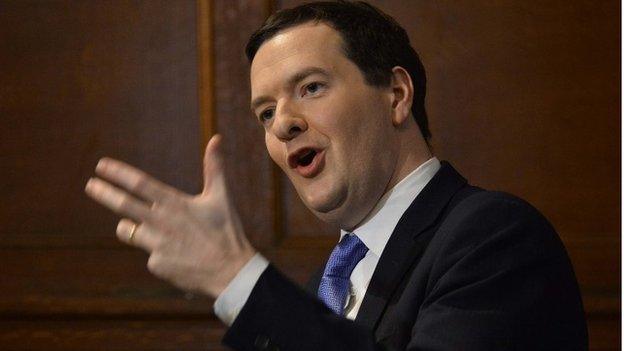Will IMF’s Blanchard blanch?
- Published
- comments

Mr Osborne stuck to his public spending cuts despite criticism from the IMF
Just nine months ago, the IMF's chief economist, Olivier Blanchard, warned Britain's chancellor of the exchequer that he was "playing with fire" by not easing the pace of public spending cuts, at a time when the UK's economy was flatter than the proverbial pancake.
George Osborne did not budge.
But the International Monetary Fund has. Its latest economic forecast shows the UK as the second fastest growing of the world's big developed economies - with only America, on the IMF's projections, set to grow faster in 2014.
What's more, the IMF may be forced to revise its projections for the UK higher still, because its forecast of 2.4% GDP growth in the current year is still below that of most economists.
The Bank of England, for example, expects a 2.8% rise in national income.
Embarrassing for the IMF?
A bit.
Not in the pink yet
But what some will see as perhaps piquant or amusing, this time the IMF would be seen by Mr Osborne as getting it wrong for being less hairshirt about fixing a hole in the public finances than he feels is necessary - when historically the IMF has been accused of being too hairshirt with highly indebted countries.
That said, not even Mr Osborne is today arguing that the UK economy is back in the pink.
His position is that the patient is recovering, but that a regimen of public expenditure cuts remains the order of the day (which will not warm the cockles of all).
And there is another thing (well a few things actually). To tell you what you may already know (I am making the heroic assumption that you have been paying attention):
1)too much of the UK's recovery is arguably based on consumption rather than investment, and is vulnerable to rises in interest rates,
2)there is a disturbing widening in the deficit between what we buy from the rest of the world and what we sell abroad, and
3)as yet, the growth is not feeding through to the pounds in our pockets, to our living standards.
Bumpy road to recovery
It would probably be a little presumptuous, or hubristic, to assume that we are back on a long journey of sustained and sustainable growth, and that there won't be bumps, deviations and reverses.
Oh, and unlike economies currently performing a good deal worse than ours - such as Germany's - UK GDP is still below its pre-crisis peak.
So it will be a few months yet before British national income is back to where it was in the first quarter of 2008, and rather longer before the disposable incomes of British people will have recovered to pre-Crash levels.
All that said, Britain's recovery is real and is the best we've experienced for years. Who's complaining?